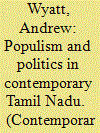| Srl | Item |
| 1 |
ID:
127072


|
|
|
|
|
| Publication |
2013.
|
| Summary/Abstract |
Commentary on Indian politics frequently uses the term populism narrowly to refer to short-term, electorally driven expenditure. However, the term is more insightfully used when referring to an ideological construct that celebrates the importance of the people as an undivided group. Politics in Tamil Nadu has had a strongly populist character since the 1960s with both the Dravida Munnetra Kazhagam (DMK) and All-India Anna DMK (AIADMK) making appeals to the 'people' of the state. In the last decade, the DMK has adjusted its populist appeals to better connect with lower status groups, a constituency traditionally targeted by the AIADMK. The AIADMK re-worked its approach, using a technocratic populist discourse during its campaign to win the 2011 assembly elections, addressing concerns of higher status voters while still acknowledging its poorer supporters. Populist appeals have been adjusted to compensate for political weaknesses in the two governing parties. Economic and social changes since the late 1990s have created opportunities, as well as imperatives, for reworking populist appeals.
|
|
|
|
|
|
|
|
|
|
|
|
|
|
|
|
| 2 |
ID:
115269


|
|
|
|
|
| Publication |
2012.
|
| Summary/Abstract |
This article seeks to unpack the implications of technocracy for contemporary peace-building. It aims to illustrate how the bureaucratic imperative explains much about the ascendancy of certain actors to positions of prominence on the peace-building landscape, and the types of activities that these actors engage in. In line with world polity theory, it is interested in the construction and institutionalization of discourses, understandings, expectations and practices of peace-building. It argues that there has been a 'technocratic turn' in relation to peace-building, whereby there has been a gradual but persistent trend towards the application of technocracy in the framing of conflict and approaches to it. Two key claims advanced on behalf of technocracy - neutrality and efficiency - are discussed. The article then argues that a complex mix of structural and proximate factors have reinforced the technocratic turn in peace-building. It concludes by considering the extent to which the discursive framing of conflict by key actors predetermines their conflict response. The article is primarily an exercise in conceptual scoping, though it can also be read as a contribution to the critique of the liberal peace and considerations of resistance and agency in peace-building contexts.
|
|
|
|
|
|
|
|
|
|
|
|
|
|
|
|